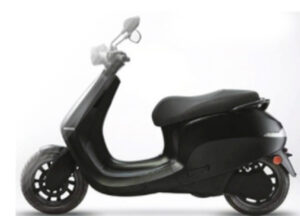Registered with the Registrar of Newspapers for India under R.N.I 53640/91
Vol. XXXI No. 13, October 16-31, 2021
The Ola scooters
by S. Viswanathan
The integrated Ola electric scooter manufacturing facility spread over 500 acres at Hosur, Tamil Nadu will house production areas for batteries, motors, paint shop, welding, general assembly and finished goods as well as two supplier parks. The plant will have its own test track.

The description of Ola’s electric scooter project by promoter Bhavish Aggarwal is so impressive: a capacity of 10 million electric scooters. A single, completely automated plant. Great resort to artificial intelligence (AI). Swedish industrial giant ABB providing a tech system with over 3,000 robots and automated guide vehicles. Siemens’ Digital Enterprise software to optimise factory layout. Investment of Rs 2,400 crore.
Aggarwal has been working at great speed. The MoU was signed in December 2020 and the land was taken possession within weeks. Production targeted to commence mid 2021.
Ola acquired Netherland’s Etergo company last year. Etergo’s electric scooter is powered by a swappable high-energy-density battery and claims to be capable of running 240 km on a single charge.
The promoters have attracted handsome support from Ratan Tata, Pawan Munjal (Hero MotoCorp), Hyundai and Kia Motors and SoftBank of Japan among others.
For Global markets too!
The present Indian market for all types of two-wheelers is around 20 million. Hero Motors alone accounts for a capacity of nearly 10 million in its five plants and there are other strong producers like Bajaj Auto, TVS Motors, Honda, Yamaha, Suzuki, Enfield… Ola is racing ahead to build an initial capacity of two million and expand to full capacity in quick time. Aggarwal seems to be confident of his Hosur plant emerging the largest centre of production not just for India but also export markets spread from Australia and New Zealand to Europe. He firmly believes that the demand for sophisticated personal vehicles would grow across the globe including in the developed countries.
From shared mobility back to personal vehicle
Until a decade ago the stress was on shared mobility. Large ride companies like Uber, Ola, the Chinese giant Didi Chuxing weaned aspirations for owning personal vehicles. The Covid pandemic that saw a steep fall in demand for shared rides, is reviving interest in personal mobility. The timing thus appears opportune. Ola ride share had a meteoric rise. But the comapny has not made profits on its operations and has been riding on phenomenal valuations. Both Uber and Ola have suffered the Covid-19 lockdowns and reportedly lost around 35,000 vehicles from their fleets since September 2020 due to the inability of drivers to repay their monthly instalments on vehicles purchased on loans.
Ola posted a loss of Rs. 2,592.93 crore in FY19. According to a report, around 95 per cent of Ola’s 33,000 leased vehicles were lying unused. Ola and Uber, encouraged drivers to purchase vehicles through loans; they no longer have the capacity to earn the income for loan repayments.
Ill timed foray into Britain, Australia…
Ola launched ride-sharing operations in the UK and Australia with great fanfare. But these have been huge failures: operations were banned in London. Even within India the several thousand small entrepreneurs who invested in the Ola franchise are in distress. They were attracted earlier by the very liberal incentives offered by Ola. The company seems to have been reckless in offering incentives as high as Rs 500 per ride for attracting auto drivers/owners into its fold. A few of these recorded earnings of even a lakh of rupees a month for a while! Understandably, this was not sustainable.
Sceptics and supporters aplenty
There is, therefore, some scepticism on similar ambitions built around on the electric two-wheeler. Maintaining growth at high levels based on exotic market valuations is tough to sustain. But optimists point to investors like SoftBank and Tencent with mountains of money willing to bet on the success of a couple of ventures risking outright losses in 8 out of 10.
Others point to the meteoric rise of Elon Musk and his electric car Tesla. When plans on the concept of electric vehicle/car was announced by Musk, top auto giants across the globe, General Motors, Ford, Volkswagen… were not enthused.
There was little progress on the EV concept at these companies. Yet Tesla proved an outstanding success. And Musk had the last laugh. His technology concepts extended to space travel and other exotic frontiers. Valuations were again phenomenally high. Such concepts based on IT are a big departure from conventional brick and mortar ideas.
Aggarwal’s Ola Scooter can be a game changer. How will it impact the existing two-wheeler manufacturers? – (Courtesy: Industrial Economist, June 2021).

